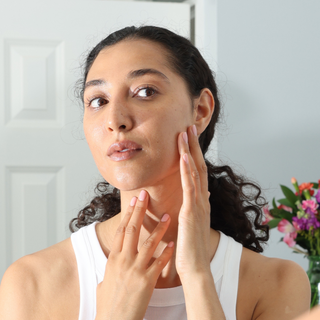The skin barrier has been getting a lot of attention and is a hot topic within the industry, but with good reason. The skin barrier serves such an important role for our health and how our body functions.
Let's talk about what the skin barrier is, its importance and how to care for it. We set ourselves up for healthy skin if we understand how to maintain a healthy skin barrier. A healthy skin barrier is foundational for healthy skin.
What is the skin barrier?
The skin is composed of many layers. The skin barrier refers to the stratum corneum (SC) or the outermost layer of the epidermis and skin. The SC is mainly composed of corneocytes and lipids. Corneocytes are dead skin cells, which may come as a surprise. Our skin cells go through a process known as keratinization as they move up through the different layers, allowing our skin to constantly turn over or cycle. Lipids like ceramides, cholesterol and fatty acids help hold the corneocytes tightly together creating the protective network. Corneodesmosomes are junctions between corneocytes and contribute to maintaining the structure of the SC. A simplified analogy that is commonly used to describe the SC is the brick-and-mortar concept (Figure 1), where the corneocytes are the bricks and the lipid matrix represents the mortar.
 Figure 1: General depiction of the stratum corneum
Figure 1: General depiction of the stratum corneum
Lipids within corneocytes are known as natural moisturizing factors (NMFs) and assist with keeping the SC and the deeper layers hydrated and nourished. The SC has about 10-30% water content which is necessary for general function but also hydrates the corneocytes. This allows them to be flexible and prevents flaking and cracking. However, the skin barrier is quite adaptive to its surroundings. The skin can detect the humidity of its environment and adjust its water content. Hydration is very important for our skin but as we age, the concentration of NMFs decline. This and your climate are important to keep in mind to effectively hydrate your skin and maintain a healthy skin barrier.
Why is it important?
Our skin barrier serves an incredibly important role as our body?s first line of defense. The SC protects or shields us from the environment. It is exposed to UV rays, pollution, microbes, toxins, etc. It also regulates and allows moisture retention and keeps us hydrated. The SC participates in the transportation of vital nutrients to other layers of our skin and our body. These factors combined are responsible for maintaining homeostasis and keeping our body balanced and functioning properly. The skin barrier is also a primary indication of health and healthy skin.
The skin barrier has a somewhat lower pH meaning it?s naturally slightly acidic. This is often referred to as the ?acid mantle?. This feature of our skin barrier provides a buffer against the growth of harmful microbes. The acidic nature of our SC contributes to proper healing processes and various biological process like NMF synthesis, ceramide synthesis and desquamation.
What damages or weakens the skin barrier?
Unfortunately, many things can damage or weaken the skin barrier. As mentioned previously, our environment heavily impacts the SC. We expose our skin to various allergens, irritants, toxins, pollution and UV, all which can damage our skin barrier with enough exposure. In addition, our lifestyle, diet, amount of sleep, personal products used and level of stress can affect the skin barrier. The use of harsh products and harsh surfactants in cleansers, detergents and exfoliants can heavily damage the SC. UV exposure, smoking and constant exposure to pollution are some of the most damaging things to our SC. We have to be gentle with and protect our skin.
What are signs of a damaged or compromised barrier?
There are a handful of signs that our skin barrier is damaged. There is often a combination of symptoms tied to a damaged skin barrier.
- Dry, itchy skin
- Rough skin
- Increased water loss (dehydration)
- Discoloration
- Wrinkles
- Prone to infection
- Acne
- Thinning of skin
- Lack of elasticity
Sometimes it can be hard to determine what stems from a damage skin barrier and what is normal.
How can we protect it?
To maintain a healthy skin barrier or repair a damaged skin barrier, it?s important to be gentle with your skin. When washing your face or applying products, try to avoid tugging on your skin or aggressive motions. Also look for products that contain hydrating ingredients to nourish the skin. Take advantage of nighttime by using heavier products with oils to replenish. And most importantly, wear sunscreen to protect your skin and all the effort you invest into maintaining or repairing your skin barrier.
It's very important to focus on having a healthy skin barrier before addressing other concerns. A healthy skin barrier needs to be a baseline before anything else.








